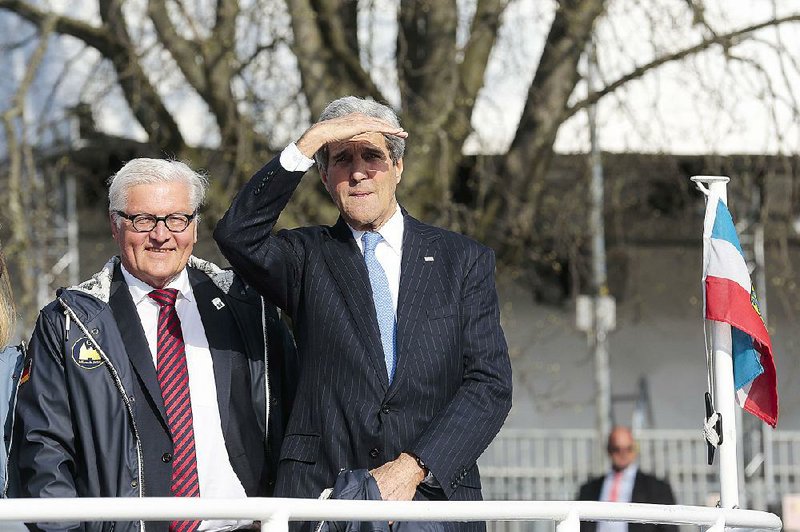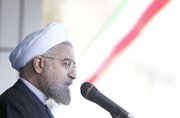TEHRAN, Iran -- Iran's president on Wednesday dismissed a compromise worked out between President Barack Obama's administration and Congress over an impending nuclear agreement as internal American politics, saying the Iranians are negotiating with six countries, not just the United States.
President Hassan Rouhani also reiterated Iran's position that economic sanctions that have been imposed on the country for years by the U.S., the United Nations and the European Union must be lifted with the signing of any final agreement on limiting Iran's ability to produce a nuclear weapon. The U.S. wants sanctions dropped only after Iran meets the terms of the deal.
The remarks by Rouhani, a prime architect of a framework nuclear agreement reached April 2 with world powers, was the first official Iranian reaction to a compromise reached Tuesday between the White House and the Senate over the nuclear negotiations.
In what was seen by some as a setback for the White House, the compromise, in the form of a Senate bill, would give lawmakers a greater say in the terms of a final deal. Negotiators of Iran and the so-called P5-plus-1 group -- Britain, China, France, Germany, Russia and the United States -- are working to complete the deal by June 30.
Republicans and some Democrats in Congress have expressed worry that provisions of the framework agreement are too lenient toward Iran and would leave it with the capacity to divert nuclear-energy enrichment to make bombs, despite Iran's guarantees that its purposes are peaceful.
Israel's government, which considers Iran its most dangerous enemy, has expressed the same doubts.
"I declare here that whatever the U.S. Senate says and what the House of Representatives and radicals in America are after, what the mercenaries in the region say, is not related to our nation and the government," Rouhani said during a speech in northern Iran reported by state media.
"We request cooperation for cooperation, good will for good will, respect for respect," Rouhani said. "We declare to you that we are not negotiating with the U.S. Senate or the House of Representatives. The party we are negotiating with is called the P5-plus-1 group."
Rouhani drew loud applause by emphasizing Iran's position that any nuclear agreement was predicated on a termination of all the sanctions, which have severely impaired the country's economy.
"Let the world, the P5-plus-1, the U.S. House of Representatives and the Senate, the U.S. president and the U.S. government, let everybody know that if there is not going to be an end to sanctions in this round of the talks, there is not going to be a deal," he said.
"At the end of these talks and upon the time of signing the deal there should be an announcement on the end and lifting of the oppressive sanctions against the Iranian nation."
Elsewhere on Wednesday, Secretary of State John Kerry reassured world powers that a final agreement with Iran would hold up to congressional scrutiny, as Germany raised the question of how Washington politics might influence the deal.
After Obama accepted a compromise with Congress, Kerry flew to Germany to brief foreign ministers from the Group of Seven industrial nations, which includes Germany, France and Britain.
"We are confident about our ability for the president to negotiate an agreement and to do so with the ability to make the world safer," Kerry said Wednesday in the northern city of Luebeck, where he joined the G-7 talks for less than four hours.
Kerry told G-7 ministers that while the deal with Congress involves a concession on oversight, it gives Obama a free hand to negotiate and push through an agreement, according to two European diplomats close to the talks who asked not to be identified because the discussions were private.
German Foreign Minister Frank-Walter Steinmeier, who hosted the two-day meeting and is one of the Iran negotiators, said ministers came away with confidence that an accord could survive.
"If this wasn't satisfactory in the view of the administration, they wouldn't have made this compromise with the U.S. Congress," Steinmeier said after the meeting.
israeli's speech cited
In Israel, officials welcomed the compromise reached in Washington, with Yuval Steinitz, the minister of intelligence and strategic affairs, describing the congressional move as "an achievement for Israeli policy."
He credited the March 3 speech in Congress by Prime Minister Benjamin Netanyahu as "decisive" in developing the bill, which Steinitz called "a very important element in preventing a bad deal."
"This is more pressure and another barrier in the face of a bad agreement," Steinitz, who lobbied in London and Paris before the framework was announced, said Wednesday on Israel Radio. "Therefore the administration and the negotiating team will make more of an effort to seal gaps and to achieve an agreement that looks better, or is at least more reasonable, so that it will pass in Congress."
Netanyahu has been one of the most vocal critics of the tentative deal with Iran, saying it is a bad deal that would leave the country still capable of making nuclear weapons.
Israel views a nuclear-armed Iran a threat to its very existence, noting Tehran's support of Israel's enemies such as Hezbollah in Lebanon and Palestinian groups Hamas and Islamic Jihad.
As Israel marked its Holocaust memorial day Wednesday, Netanyahu compared Iran to the Nazis and warned that the Islamic Republic must be prevented from obtaining nuclear weapons.
Netanyahu linked the Nazi genocide of 6 million Jews in World War II to Iran's contested nuclear program and repeated references by some of the Islamic Republic leaders to the destruction of Israel.
"As the Nazis strived to trample civilization and replace it with a 'master race' while destroying the Jewish people, so is Iran striving to take over the region and expand further with a declared goal of destroying the Jewish state," Netanyahu said.
He again criticized the framework deal with Iran.
"Instead of demanding Iran significantly dismantle its nuclear capabilities and conditioning lifting sanctions on it ending its aggressions, the world powers are retreating, leaving Iran with nuclear capabilities and even allowing it to expand them later on regardless to its actions in the Middle East and around the world," Netanyahu said.
Several Republicans in the U.S. share that view, including New Jersey Gov. Chris Christie, a potential 2016 presidential candidate, who said Wednesday that the emerging pact would lead to an even more dangerous Middle East.
Introducing himself to New Hampshire voters at a town hall-style meeting, Christie said the world has no reason to trust Iran. He said it takes guts to enter a deal, but also to back away from one -- which he urged Obama to do.
Information for this article was contributed by Thomas Erdbrink, Rick Gladstone and Jodi Rudoren of The New York Times; by Jill Colvin and staff members of The Associated Press; and by Patrick Donahue, Arne Delfs, Margaret Talev and Gregory Viscusi of Bloomberg News.
A Section on 04/16/2015

